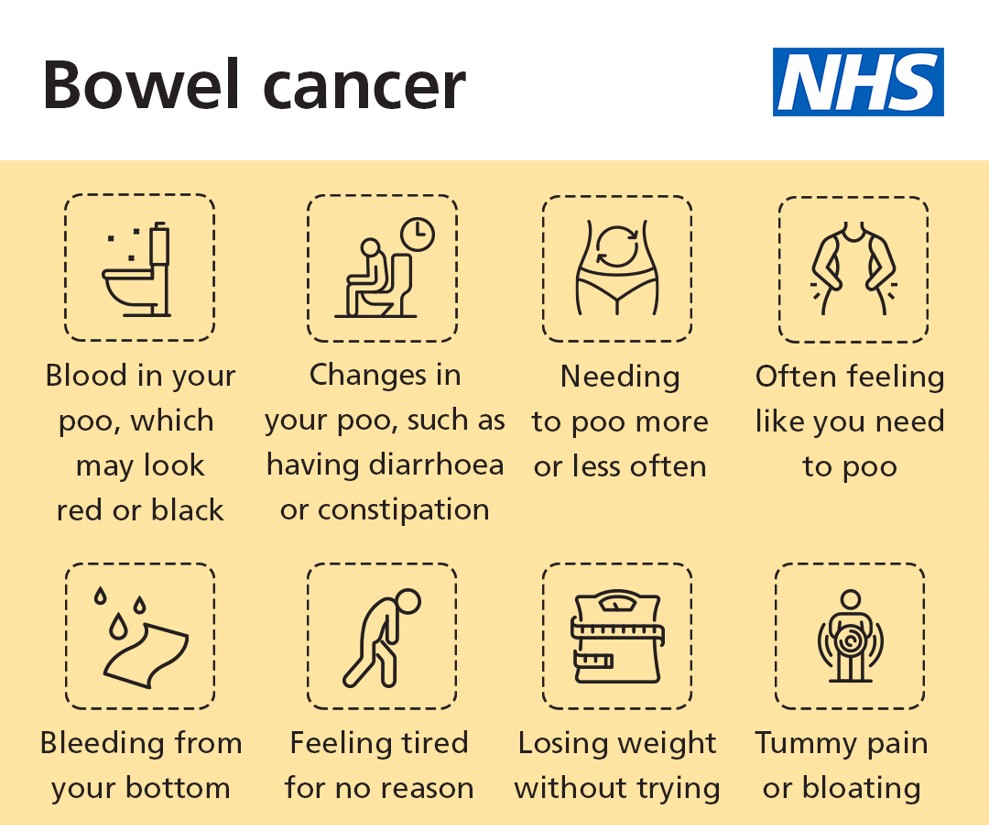Bowel cancer is cancer found anywhere in the large bowel, which includes the colon and rectum. The large bowel is part of your digestive system. It helps absorb water from your food and removes food waste from your body.
It’s one of the most common types of cancer in the UK and it is the 2nd most common cause of cancer death in the UK.
NHS bowel cancer screening checks are available to everyone aged 60 to 74 years. Screening allows for early detection and therefore increasing the chance of recovery.
Who is at risk of bowel cancer?
It is hard to make any definite statements about what causes bowel cancer, but there are certain health conditions and environmental factors that may put you more at risk. You may be more likely to get bowel cancer if:
- You smoke
- You are overweight
- You are over 50
- You have an inflammatory bowel disease such as Ulcerative colitis or Crohn’s disease
- You eat too much red meat
- You eat too little fibre
- You have a family member who has had bowel cancer
Bowel cancer screening
As a preventative measure, make sure you do your home kit screening test when you get them. See here for further information
Some of these (like age, pre-existing bowel conditions and family history) are natural and therefore are not preventable. However, to lower your risk of bowel cancer consider the following if necessary:
Do
- Eat a healthy diet including at least 5 portions of fruit and vegetables a day
- Stay active and exercise regularly
- Lose weight if you’re overweight
- Quit smoking
- Drink less alcohol
- Eat less red and processed meat
Symptoms

If you notice any of the following symptoms for 3 or more weeks, please go see your GP:
- Blood in your poo
- Changes in your poo (diarrhoea and constipation)
- Needing to poo more or less often than usual
- Feeling like you need to poo, even if you just went
- Bleeding from your bottom
- Feeling tired
- Losing weight without trying
- Bloating
Your GP appointment
Before your appointment
In order to get the most out of your appointment, you should come prepared with the following information:
- Write down your symptoms including when they started, when they happen and how often you have them.
- Write down anything that makes them worse or better.
- Any family history of cancer
During your appointment
Your doctor will start by asking you questions relating to your symptoms and medical history. They may also do the following:
- Do a rectal examination where they will put a gloved finger inside your bottom to check for any lumps. You may ask for a chaperone to be present.
- Feel your tummy for lumps
- Ask for a poo sample. They will give you instructions on how to do this.
After your appointment
Your doctor may arrange for you to have some further blood tests. These might be at your GP surgery or at the hospital.
They might also refer you to a specialist. This does not automatically mean that you have bowel cancer. It is just so that specialist can run some more tests on you. Normally they will refer you for a colonoscopy to check for further signs of cancer. This may involve also taking a small sample of your bowel lining.